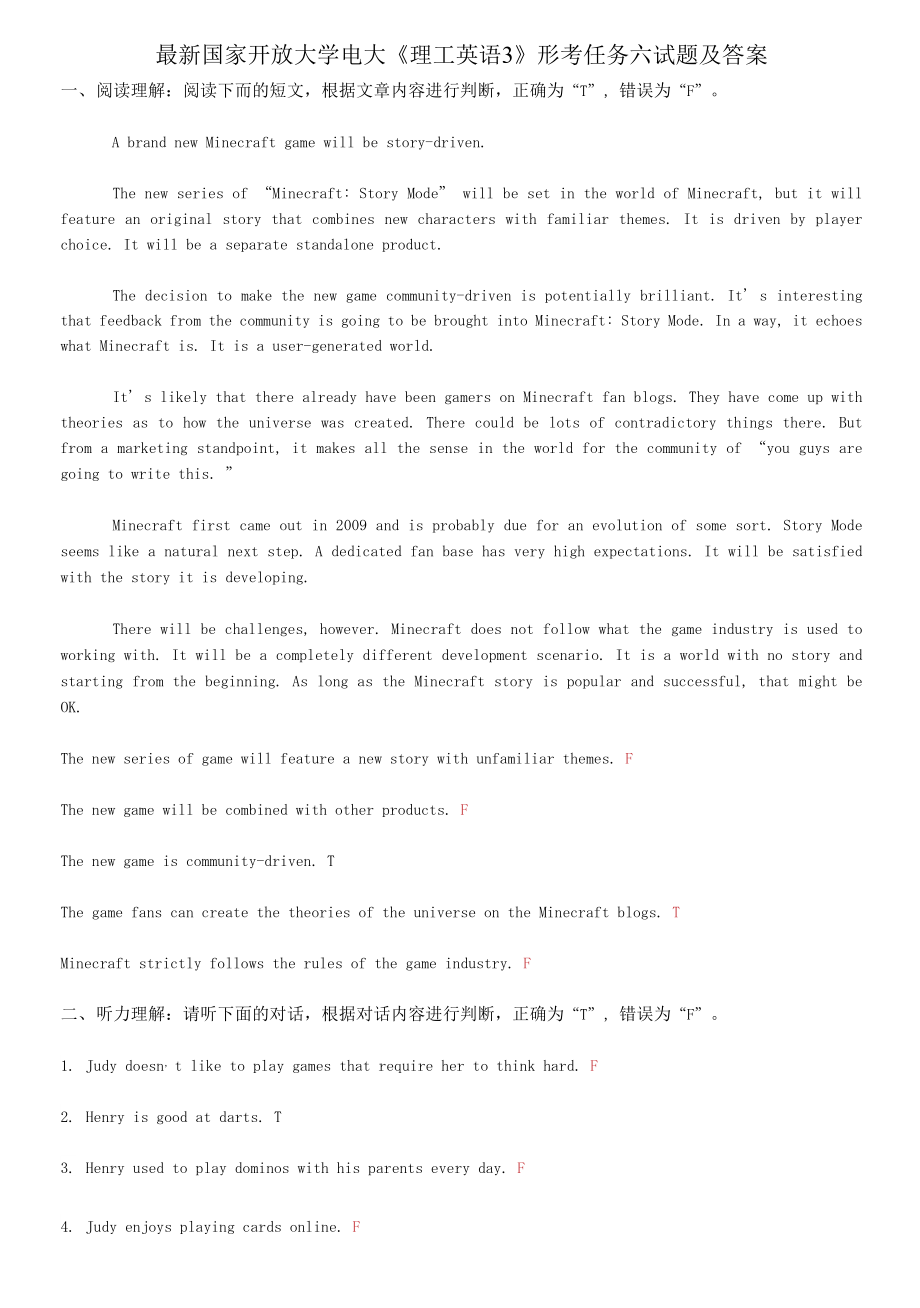《國(guó)家開(kāi)放大學(xué)電大《理工英語(yǔ)3》形考任務(wù)六試題及答案》由會(huì)員分享����,可在線閱讀,更多相關(guān)《國(guó)家開(kāi)放大學(xué)電大《理工英語(yǔ)3》形考任務(wù)六試題及答案(3頁(yè)珍藏版)》請(qǐng)?jiān)谘b配圖網(wǎng)上搜索����。
1����、最新國(guó)家開(kāi)放大學(xué)電大《理工英語(yǔ)3》形考任務(wù)六試題及答案
一����、 閱讀理解:閱讀下而的短文,根據(jù)文章內(nèi)容進(jìn)行判斷����,正確為“T”,錯(cuò)誤為“F”����。
A brand new Minecraft game will be story-driven.
The new series of “Minecraft: Story Mode” will be set in the world of Minecraft, but it will feature an original story that combines new characters with familiar themes. It is dr
2、iven by player choice. It will be a separate standalone product.
The decision to make the new game community-driven is potentially brilliant. It' s interesting that feedback from the community is going to be brought into Minecraft: Story Mode. In a way, it echoes what Minecraft is. It is a user-gen
3����、erated world.
It' s likely that there already have been gamers on Minecraft fan blogs. They have come up with theories as to how the universe was created. There could be lots of contradictory things there. But from a marketing standpoint, it makes all the sense in the world for the community of “yo
4、u guys are going to write this. ”
Minecraft first came out in 2009 and is probably due for an evolution of some sort. Story Mode seems like a natural next step. A dedicated fan base has very high expectations. It will be satisfied with the story it is developing.
There will be challenges, however.
5����、 Minecraft does not follow what the game industry is used to working with. It will be a completely different development scenario. It is a world with no story and starting from the beginning. As long as the Minecraft story is popular and successful, that might be OK.
The new series of game will fea
6、ture a new story with unfamiliar themes. F
The new game will be combined with other products. F
The new game is community-driven. T
The game fans can create the theories of the universe on the Minecraft blogs. T
Minecraft strictly follows the rules of the game industry. F
二����、 聽(tīng)力理解:請(qǐng)聽(tīng)下面的對(duì)話����,根據(jù)對(duì)話內(nèi)容
7����、進(jìn)行判斷����,正確為“T”,錯(cuò)誤為“F”����。
1. Judy doesn,t like to play games that require her to think hard. F
2. Henry is good at darts. T
3. Henry used to play dominos with his parents every day. F
4. Judy enjoys playing cards online. F
5. Judy is an expert at mahjong.
二����、閱讀理解:閱讀下面的短文,根據(jù)文章內(nèi)容從A����、B、C三個(gè)選項(xiàng)中選出一個(gè)最佳選項(xiàng)����。
I
8����、n 1933, an unknown American called Clarence Nash went to see the filmmaker Walt Disney. He had an unusual voice and he wanted to work in Disney����,s cartoon(動(dòng)畫片)film for children. When Walt Disney heard Nash's voice, he said "Stop! That's our duck!”
The duck was the now-famous Donald Duck, who first a
9、ppeared in 1934 in the film The Wise Little Hen. Donald lived in an old houseboat (水上住家)and wore his sailor jacket and hat. Later that year he became a star after an eight-minute Mickey Mouse film. The cinema audience liked him because he was lazy and greedy (貪婪的)����,and because he lost his temper (發(fā)脾氣
10、)very quickly . And they loved his voice when he became angry with Mickey����,s eight nephews (侄子).Soon Donald was more popular than Mickey Mouse himself, probably because he wasn't a goody-goody like Mickey.
In the 1930s, 40s and 50s Donald and hid friends Mickey, Goofy and Pluto made hundreds of Disn
11、ey cartoons. He also made educational films about the place of the USA in the world, and safety in the home. Then in 1966 Donald Duck and his voice disappeared there were no more new
cartoons.
Clarence Nash died in February, 1985. But today����,s children can still see the old cartoons on television a
12、nd hear that famous voice.
1. When was the first Donald Duck film made?
A. In 1933.
B. In 1934.
C. In 1966.
2. Who was Clarence Nash?
A cartoonist
B. Donald Duck" s voice
C. A film-maker
3. Where do today's children see Donald Duck?
A. In new film
B. At the cinema
C. On television
4. Th
13����、e underlined word audience in the second paragraph means
A. formal interview
B. law freedom
C. the people who watch a film at a cinema
5. The underlined word goody-goody in the second paragraph means a person who
A. likes to appear to be faultless in behaviour
B. dislikes to appear to be faultless in behaviour
C. dislikes to be faulty in behaviour
 國(guó)家開(kāi)放大學(xué)電大《理工英語(yǔ)3》形考任務(wù)六試題及答案
國(guó)家開(kāi)放大學(xué)電大《理工英語(yǔ)3》形考任務(wù)六試題及答案

